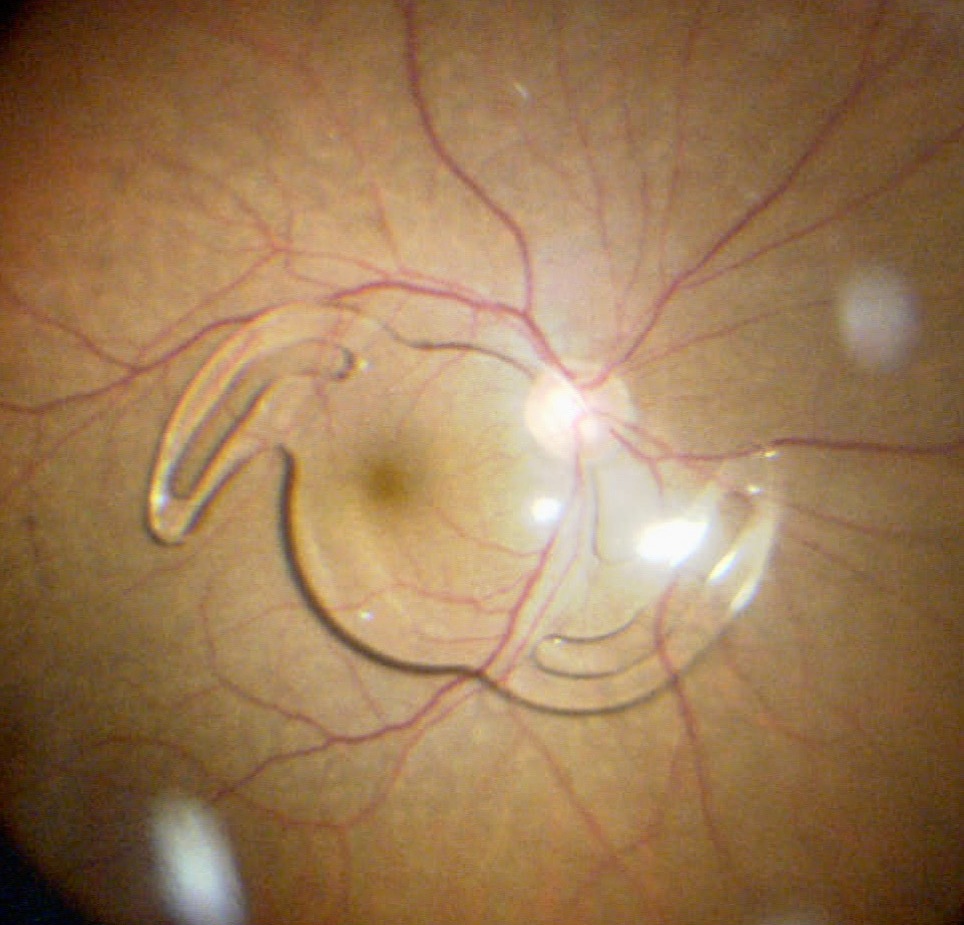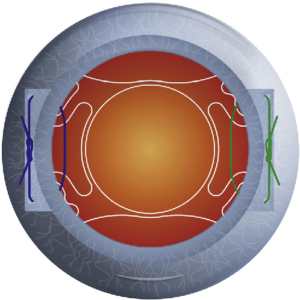Dislocated Lens Symptoms & Diagnosis
Neighborhood Retina Care Doctors in Sarasota, FL
Retina Specialists Providing Treatment for:
Dislocated Lens Symptoms and Diagnosis
Sudden vision loss after cataract surgery may indicate that the lens implant has fallen out of position. Having a cataract lens implant dislocate is an increasingly common occurrence, especially as patients receive cataract surgery at younger ages. If you live in Sarasota or Manatee county and are concerned that your lens implant has shifted, call today for a dilated eye examination with the dislocated lens specialists at Shane Retina.
The Lens Anatomy of The Eye
The lens is an M&M-shaped structure located near the front of the eye. It is held in place by tiny, hair-like cables called zonules. The zonules run around the entire circumference of the lens, connecting it to muscles in the eye wall. When the muscles contract, the lens changes shape, allowing the eye to focus on multiple distances.
In youth, the lens is soft and clear. As time goes by, the lens gets harder and yellower. Eventually, light has a difficult time passing through the lens, forming a cataract. When the cataract starts to interfere with daily visual activities, it is time for surgical cataract removal and replacement with an artificial lens implant.
What Happens During Cataract Surgery?
During cataract surgery, a circular opening is made in the thin bag that holds the lens called the capsule. Next, the surgeon removes the hardened, yellow cataract, careful to maintain the integrity of the capsule behind the lens. After the cataract is removed, a clear, artificial lens implant is injected into the capsule. Ideally, the lens will stay centered just behind the pupil for the rest of the patient’s life.
In some cases, a problem with the capsular bag or lens implant occurs at the time of surgery. If the bag becomes detached from the wall of the eye or the lens falls into the back of the eye, a second surgery may be required to fixate a new lens to the eyewall.
How Does A Lens Dislocate?
There are two mechanisms for a lens implant to dislocate into the back of the eye. The first occurs where a break in the capsular bag that holds the lens causes the lens to slip back. The second cause happens if the cables that attach the lens to the eye wall break, allowing the entire lens-bag complex to fall into the back.
What Are the Risk Factors for A Shifted Intraocular Lens?
There are two main categories of dislocated lens implant. The first occurs during your initial cataract surgery and is caused by a break in the layer that holds the lens or the cables that attach it to the eye. Anything that weakens the lens capsule, or its cables may cause a dislocation during surgery. This includes history of previous eye surgery, trauma, or use of prostate medication. Some patients have a condition called pseudo exfoliation, which weakens the cables (zonules) that connect the lens to the eye wall.
The second mechanism for lens dislocation is the gradual breakage over time of the cables that attach the lens implant to the eye wall. Eventually, enough cables break to allow the lens to shift away from the center of the pupil. This happens more often in patients with a history of trauma, multiple eye surgeries (especially retinal detachment repair), pseudo exfoliation, and complicated original cataract surgeries.
What Are the Symptoms of a Dislocated Lens?
The most common symptom of a dislocated intraocular lens implant is sudden, painless blurring of vision in one eye. The vision tends to be very blurry, but not blacked-out. Sometimes, the lens implant can be seen resting on the surface of the retina when laying on the back. If the lens is only slightly out of position, the patient may only notice a ghost or double image at nighttime as some light passes through the pupil around the edge of the lens.
How Is A Dislocated Lens Diagnosed?
Anyone who believes that their lens implant is dislocated should seek a dilated examination with an ophthalmologist. The eye doctor will check your vision, dilate your pupils, and confirm the position of the lens. If a dislocation is found, it is important to assess the rest of the eye to ensure there are no other concerns prior to surgical repair.
What Are the Treatments for A Dislocated Lens Implant?
The treatment for a dislocated lens depends on the severity of the shift, the preferences of the patient, and the visual potential of the eye. Some lens dislocations are minor with good visual acuity and can be observed until the lens further dislocates. In other patients, the eye does not see well due to previous trauma or surgery. In these cases, performing additional surgery may be more risky than helpful. Other patients may be acclimated to using thick glasses or contact lenses to compensate for the lack of a functioning lens. Fortunately, leaving a lens implant to float in the back of the eye does not significantly raise the risk for other problems like retinal detachment.
In patients who are motivated to repair their dislocated lens, the solution involves a couple surgical options. In some cases, the original lens can be repositioned behind the pupil with assistance of sutures to the iris or eye wall. The advantage of this approach is that no large incisions are required to exchange the original lens for another. The disadvantage is that the original lens was not designed to be sutured, which may lead to tilting, rubbing, bleeding, inflammation, or recurrent dislocation of the lens implant following the repair.

Another surgical option is the replacement of the original lens with one design to be fixated to the eye wall. The advantage of this maneuver is that a specific lens that is designed for this purpose can be implanted, which leads to more reliable, long-lasting results. The disadvantage is that larger incisions are required in the wall of an eye that is already surgically experienced.
What Are the Risks of Surgery for A Dislocated Intraocular Lens?
 In most cases, the decision to repair a dislocated intraocular lens is a no-brainer, with visual acuity outcomes far superior to leaving the lens out of place. However, it is important to understand that repairing a dislocated lens is much more complex than the original cataract surgery, involving more surgical time, risk, and greater variation in post-operative glasses prescription.
In most cases, the decision to repair a dislocated intraocular lens is a no-brainer, with visual acuity outcomes far superior to leaving the lens out of place. However, it is important to understand that repairing a dislocated lens is much more complex than the original cataract surgery, involving more surgical time, risk, and greater variation in post-operative glasses prescription.
Among the complications that can occur with surgery for dislocated lens implant is corneal swelling, bleeding in the eye, retinal detachment, infection, and need for glasses after the procedure. Each of these complications is treatable, and even patients who experience these events tend to have visual outcomes much better than before surgery. It is rare for a lens that is sutured to the eyewall to dislocate again following surgery.
Dislocated Lens Surgery Is Sarasota And Manatee County
Shane Retina, is specialized in managing dislocated lenses. If you experience the symptoms mentioned above, consider having a dilated eye examination with an ophthalmologist. This exam may involve photographs or other specialized imaging tests of the retina. There are effective surgical treatments for a dislocated intraocular lens, so do not delay your evaluation.
